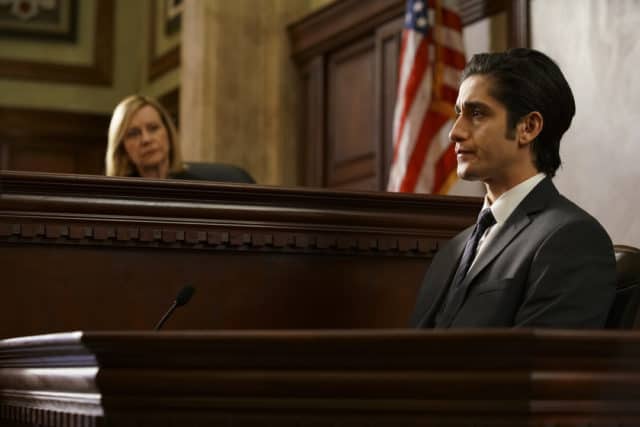
Chicago Justice has not been on a full week, yet three episodes in the show is filling huge vacancy on the television canvas for a quality courtroom drama. That’s not a criticism on any long-running shows. On the contrary, Law & Order: SVU‘s 400 plus episodes speak for themselves, but they’re also in their own niche. With concise and thoughtful writing, particularly with lines Philip Winchester wields, Chicago Justice is creating an important dialogue about why preconceptions of the heart can’t win out over the mind’s judgment in a courtroom.
The state’s attorney’s office prosecutes a white student named Byron Welsh for the murder of a Muslim student named Danny Nasiri. Because Byron had already beaten Danny once before, it doesn’t seem like big leap that he would elevate to murder. However, Dawson and Nagel find evidence that says otherwise in the form of a girl who convinced Danny to drop charges against Byron, hoping to bring peace on campus. So why didn’t she come forward? Bridging the divide between Muslims and Western culture is one thing, but having a full blown relationship complete with sex tape is definitely not something any Muslim parent would approve of. It’s tough to get anyone in this case talking to find a new suspect. Most Muslims in the community won’t talk for fear of being targeted for their race and religion, and the non-Muslims won’t talk for fear of being labeled an ‘Islamaphobe’. It’s a wonder the state’s attorney’s investigative team could make any progress at all with the amount of fear saturated in our society.
One witness does point the state in the right direction. Despite putting on a good act, Dawson doesn’t believe that the victim’s former roommate Jafar Boustani bore him no ill will. They were already on bad terms since Jafar was jealous of Danny’s success in physics. A Muslim woman in the neighborhood comes forward and gives a thorough description of Jafar snatching Danny after a heated argument. Here’s where we get an up close and personal look at the way Muslims are treated in a courtroom. Mind you this is a courtroom with a Muslim victim, a Muslim defendant, and Muslim eyewitness, and still everything that happens in that room is through a layer of feigned ignorance. I say feigned because the lawyers are doubly prepared in order to explain things in extreme detail to a jury.
The only person who is a little confused is Valdez, especially during jury selection. That’s a very interesting process. Both sides have no arguments over potential jurors, choosing to pick members who have some connection to patriotism. Valdez feels confident their witness’s vivid account of the attack will seal the case, until she walks in wearing a niqÄb. This one article of clothing which is important to her faith is manipulated a half a dozen ways to place doubt on her credibility. It doesn’t work, but the fact that Valdez and Stone weren’t prepared for it could have been a serious miscalculation.
Stone has to make the point that the courtroom can be an unpredictable place, so you can never just assume anything about a case you are presenting. Boy is that the truth. As soon as Jafar is put on the stand he admits to killing Danny, but he says he did so because he believed his former friend had been turned into a terrorist and was about to carry out an attack. Propaganda videos on Danny’s phone support Jafar’s claim. That’s definitely not something a prosecutor wants to be blindsided by. Almost immediately the conversation does shift. Why convict a man for preventing a terrorist attack, even if he wasn’t 100% sure Danny would go through with it? Because convictions should be made about the letter of the law, not about how we feel. Adding in that the letter of the law is what patriots die to defend aids Stone’s closing argument. The jury comes back with a guilty verdict, though there will undoubtedly be a debate about whether or not this was right call.
Do you think the jury made the right call?
 Follow Us
Follow Us





